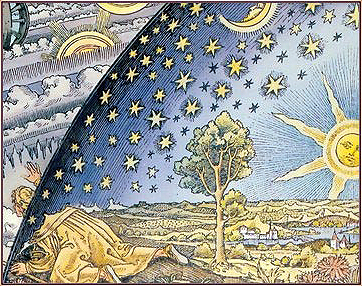Kabbalah
Also spelled Kabbala, Kabalah, Kabala, Cabala, Cabbala, Cabalah, Cabbalah, Qabala, Qabbala, Qabalah and Qabbalah.
Generically, Jewish mysticism in all its forms; a mystical Hebrew study of methods for controlling spirits and demons; Jewish mystical tradition.
Specifically, the Jewish esoteric theosophy; the system of esoteric mystical speculation and practice that developed during the 12th-century and crystallized in 13th-century Spain and Provence, France, around Sefer ha-zohar (The Book of Splendor), referred to as the Zohar, and generated all later mystical movements in Judaism. It is largely mathematical in nature, concentrating on the configurations of certain magical words, anagrams, names of angels, etc.
The word 'Kabbalah' is derived from the root 'to receive, to accept', and in many cases is used synonymously with 'tradition'. Kabbalistic interest, at first confined to a select few, became the preoccupation of large numbers of Jews following their expulsion from Spain (1492) and Portugal (1495).
Like every other Jewish religious expression, Kabbalah was based on the Old Testament revelation. The revealed text was interpreted with the aid of various hermeneutic techniques. Of the many methods available, the Kabbalists most frequently used three forms of letter and number symbolism: gematria, notarikon, and temurah.
The classic document of the Kabbalistic tradition, the Zohar, was compiled by Moses de Leon about 1290. The doctrine of creation was built on a theory of emanations and asserted that the world derived from the transcendent and unknowable God through a series of increasingly material manifestations (sephirot).
The sephirot form the central image of Kabbalistic meditation, the Sephirothic Tree of Life, which describes the path of descent from the divine to the material realm, and the path of ascent to the highest level of spirituality.
| | | | | | 
| | |  | | | | In this 17th-century engraving, the initiate is breaking through the invisible veil which separates the physical realm from the material. |
| |
| | |
Each sephirath is a level of attainment in knowledge, corresponding to energy centers in the body, and is also divided into four interlocking sections or 'Worlds', which constitute the cosmos: emanation (Atziluth), creation (Briah), formation (Yetzirah), and action or making (Assiyah). Through contemplation and meditation, similar to Eastern yogic disciplines, the Kabbalist ascends the tree of life.
The sephirot also comprise the sacred, unknowable, and unspeakable personal name of God: YHVH (Yahweh), the Tetragrammaton. So sacred is the Tetragrammaton that other names, such as Elohim and Jehovah, are substituted in its place in scripture. A more systematic presentation of the basic doctrine is contained in Moses Cordovero's Pardes rimmonim (Garden of Pomegranates, 1548).
The Kabbalah was a major influence in the development of Hasidism and still has adherents among Hasidic Jews. The Kabbalah, with its amulets, incantations, demonology, seals, and letter and number mysticism, had a profound influence on Western magical tradition. The Tetragrammaton especially was held in great awe for its power over all things in the universe, including demons.
See Divination, Acutomancy, Agalmatomancy, Coscinomancy, Cleidomancy, Augur, Stoichomancy, Dowsing, Tarot, Heptameron, Demonology, Sortilege, Idolomancy, Demonomancy, Tephramancy, Anemoscopy, Eromancy, Austromancy, Chaomancy, Roadomancy, Capnomancy, Pyromancy, Meteormancy, Ceraunoscopy, Zoomancy, Felidomancy, Mystic Gifts and Charms - New Age Gift Shop & Wicca and Pagan Supplies, Love Spells -- Use these powerful love spells to help you find and keep your true love, The Chakra Store, The Tarot Store, Divination & Scrying Tools and Supplies, Unique Amulets, Talismans, Good Luck Charms, and Love Tokens, Powerful Witch Doctor Spell Kits, Powerful Spells - Cast by Andreika the Witch, Webmasters Make $$$, AzureGreen - Celebrating All Paths to the Divine, ISIS - Tools for Your Soul's Journey, and The Pyramid Collection - Myth, Magick, Fantasy and Romance.
Sources: (1) Davidson, Gustav, Dictionary of Angels: Including the Fallen Angels, Free Press; (2) Cohen, Abraham, Everyman's Talmud: The Major Teachings of the Rabbinic Sages, Schocken; (3) Scholem, Gershom, On the Mystical Shape of the Godhead; Basic Concepts in the Kabbalah, Schocken; (4) Walker, Charles, The Encyclopedia of the Occult, Random House Value.
| | |